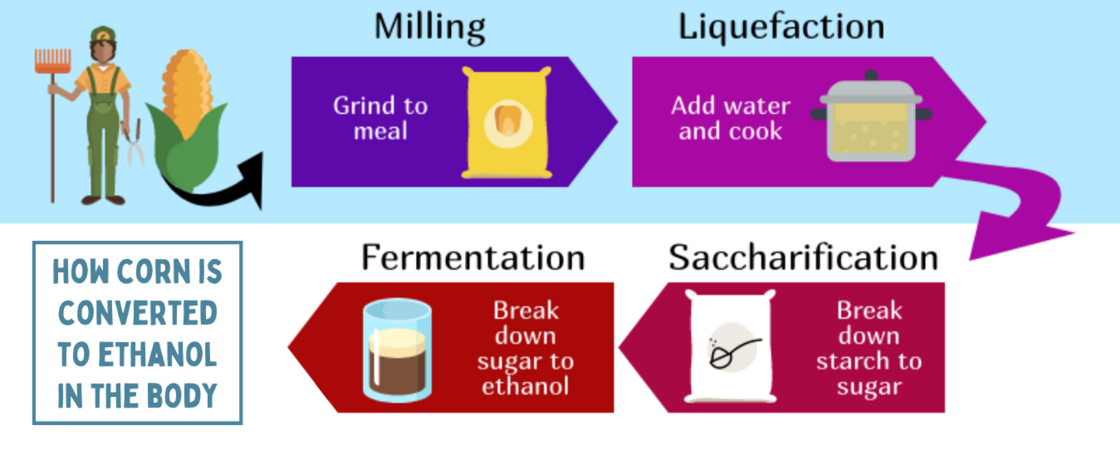
I have a client who was diagnosed with a condition called Auto-brewery Syndrome (ABS). She can get intoxicated without drinking a drop of alcohol.
How is this possible?
It turns out her body can turn carbs into ethanol.
More shocking, it turns out that all of us do this to a greater or lesser degree. And we do it every day.
To quote an article posted on May 1, 2022 in the National Library of Medicine:
“The production of endogenous ethanol occurs in minute quantities as part of normal digestion but when fermenting yeast or bacteria become pathogenic, extreme blood alcohol levels may result.” (1)
The article goes on to say:
“Patients with auto-brewery syndrome present with many of the signs and symptoms of alcohol intoxication [in the absence of alcohol] and often report a high-sugar, high-carbohydrate diet.” (1)
Have you ever felt buzzy during your sugar binges or hungover the next day? It is quite possible you were!
Signs And Symptoms of the Fermentation of Carbs into Ethanol in the Body:
- Dizziness
- Slurred Speech
- Stumbling
- Clumsiness
- Belching
- Bloating
- Mood Changes
- Vomiting
- Black Outs
- Feeling Buzzed/Tipsy/Giddy
Signs and Symptoms of a Hangover:
(Think back to the day after a sugar binge. Did you experience any of the following)?
- Headaches
- Nausea
- Dehydration
- Fatigue
- Dry Mouth
- Burping / Belching
- Moodiness
- Memory / Concentration Issues
These symptoms are signs that the body is converting carbs to ethanol through fermentation in high enough amounts to cause intoxication and a hangover (aka ethanol overdose).
Personally, I find this rather shocking!
I had NO idea we can be lean mean alcohol making machines.
Now, if you are like me, you might be wondering just how much alcohol can our inner brewery brew?
It turns out it can produce a lot!
We can produce so much, in fact, that there have been impaired driving charges against individuals who had consumed no alcohol. The charges were later dropped when medical doctors could show the individual had Auto-brewery. (4)
Research shows individuals (with ABS) can eat a cookie in a fasted state, and about a 1 hour after the ingestion, blood alcohol levels may range from 1.0-7.0 milligrams per deciliter. That is more than 10x what is legal in our bloodstream to operate a motor vehicle. (2,5)
You too can test to see if your carb consumption leads to a rise in blood alcohol levels. Home breathalyzers can be used. Or you can run the test with a lab.
What Causes Auto-Brewery Syndrome (ABS)?
“A perturbation of the gut, oral, or urinary microbiome… is the underlying condition that allows fermenting microbes to over-colonize. Such disturbances are caused by a diet high in carbohydrates and refined foods and the overuse of antibiotic and non-antibiotic drugs.” (2)
In other words, high refined carbohydrate consumption leads to a proliferation of fermenting microbes (yeast and certain bacteria) which combined with a history of pharmaceutical use (anti-biotics and others) cause Auto-brewery. (There might also be enzyme dysfunction and genetic polymorphisms involved, though that science is still emerging.)
Who does not identify with these risk factors? I sure do!
And yet most of us have never heard of this condition.
Interestingly and unfortunately, many individuals do not show symptoms of intoxication and for this reason experts suggest this condition is underdiagnosed and is often mistaken for other conditions.
“Patients may not initially present with signs and symptoms of intoxication but may report neurological symptoms, loss of coordination, and mood changes…” (2)
Furthermore,
“The patient may experience [nausea], belching, chronic fatigue syndrome, dizziness, loss of coordination, disorientation, [hangover], and irritable bowel.” (2)
Auto-brewery ethanol can harm the body just like alcohol.
According to Healthline:
“Auto brewery syndrome can also lead to (or worsen) other health conditions such as:
- chronic fatigue syndrome
- irritable bowel syndrome
- depression and anxiety” (4)
It can also contribute to the development of non-alcoholic fatty liver disease.
Moreover, an article in the Journal of Nutritional Biochemistry (1993) states that abnormal gut fermentation can lead to B-vitamin, zinc and magnesium deficiencies:
“…Abnormal gut fermentation appears to have adverse effects on levels of B vitamins, zinc, and magnesium. [It] is not clear whether this is a result of malabsorption, over-utilization, or excessive excretion.”
It goes on to say:
“The level of ethanol production in this condition is low, but the presence of the nutritional deficits implies that the syndrome may cause quite significant adverse effects on health.” (5)
In other words, even if the amount of ethanol that we brew is low, it can still have significant adverse health consequences, including nutritional deficiencies.
Beyond the negative health consequences of ethanol circulating in our bloodstream, what really fascinates me – as an addiction coach - are these questions:
- Q#1: Do us sugar addicts (and recovered alcoholics) who choose to abstain from alcohol only think we are abstaining when (potentially) in reality we are exposed to body-brewed ethanol all day long?
- Q #2: Do some sugar addicts eat sweet and starchy foods in excessive amounts for the dopamine and serotonin boosts as well as the sedative relaxing effects of internally manufactured alcohol too? Are these effects a part of our insatiable cravings?
- Q #3: For some of us, can our internal production of ‘homemade hooch’ perhaps, just maybe, make our efforts to stop consuming refined carbs more difficult because, in theory, we are letting go of two potentially addictive substances at the same time?
- Q #4: Does Auto-brewery potentially explain why many alcoholics stop drinking alcohol but start going off the deep end with bread, sugar and pasta instead (beyond the stand-alone addictive properties and drug-like effects of refined carbs)?
Further research is needed to answer these questions.
Well, there you have it…
It turns out we are alcohol making machines.
All we need is a lot of sugar, a disrupted microbiome with candida/bacteria, and darkness.
This means by extension the more sugar we eat, the more yeast in our gut, the more ethanol we can potentially produce. And not even know it. That’s crazy, isn’t?!
I hope you find this information as fascinating as I do?
Let me know.
—Florence

SOURCES:
- https://www.ncbi.nlm.nih.gov/books/NBK513346/
- https://www.healthline.com/health/auto-brewery-syndrome#:~:text=Auto%20brewery%20syndrome%20is%20also,foods%20(carbohydrates)%20into%20alcohol
- https://en.wikipedia.org/wiki/Auto-brewery_syndrome
- https://www.healthline.com/health/alcohol/effects-on-body
- https://www.sciencedirect.com/science/article/abs/pii/095528639390035U
Comments